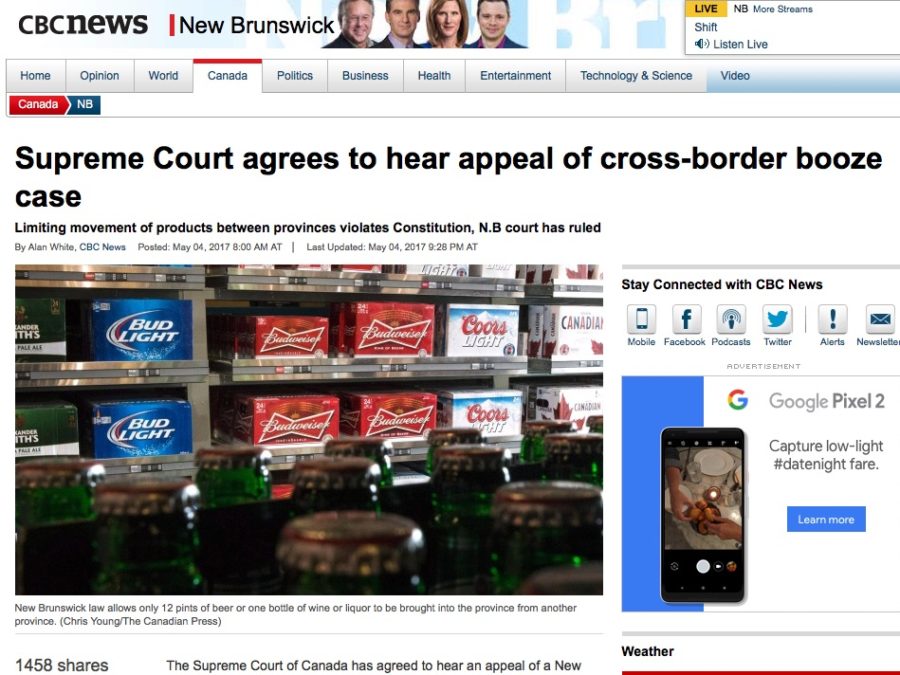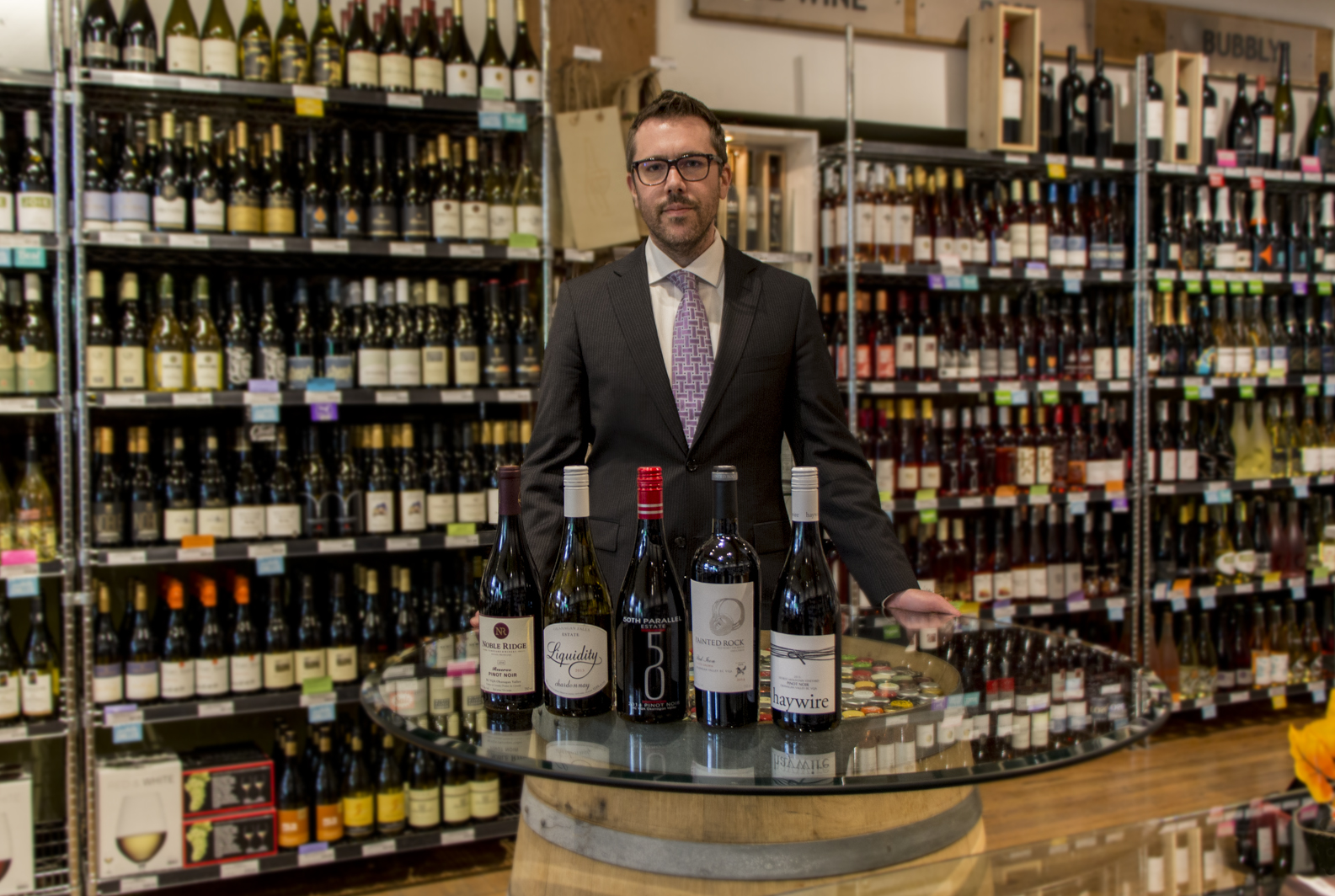Comeau Decision: #BCwine representatives intervene on Supreme Court case
Medium and small sized wine producers in British Columbia will need a bottle just to calm their nerves over the potential outcome of the Comeau Supreme Court case pending in December. The story began with New Brunswick resident Gerard Comeau, who was fined by his home province for transporting beer purchased in the neighbouring province of Quebec. The subsequent legal entanglements resulted in Canada’s highest court agreeing last May to hear the case.
 The implications for BC wine producers are potentially huge. These small businesses depend upon the ability to grow their markets across Canada. With few exceptions (Manitoba and British Columbia have no restrictions on the interprovincial shipment of liquor for personal use) provincial governments make direct shipments of wine to consumers costly and impractical. If the Comeau decision stands, it could mean that several BC wine producers will continue to thrive. If new markets do not become more available to premium B.C. wines, many predict the industry will struggle over the long term.
The implications for BC wine producers are potentially huge. These small businesses depend upon the ability to grow their markets across Canada. With few exceptions (Manitoba and British Columbia have no restrictions on the interprovincial shipment of liquor for personal use) provincial governments make direct shipments of wine to consumers costly and impractical. If the Comeau decision stands, it could mean that several BC wine producers will continue to thrive. If new markets do not become more available to premium B.C. wines, many predict the industry will struggle over the long term.
A group of winery owners from B.C. have applied to intervene to the Supreme Court on this case. Their release is below. The decision is expected before year’s end. For a good examination of the issues involved, read our friend Karen Graham’s piece in Globe and Mail.
+++
Canada’s Supreme Court to Hear From Small BC Wineries
Supreme Court Grants Intervenor Status at Comeau Case
[Vancouver, BC] Five small BC wineries have been granted permission to intervene by the Supreme Court of Canada in the inter-provincial shipping of liquor case R. v. Comeau. The Supreme Court will hear the case in early December 2017. R. v. Comeau is the first court case in which any winery in Canada has had an opportunity to address the legal barriers to inter-provincial shipping of Canadian wine. These provincially created barriers severely impede the businesses and financial viability of small wineries in British Columbia by prohibiting wineries from shipping to consumers in other provinces. The case will also deal with the fact that the law governing inter-provincial shipping of Canadian liquor is inconsistent across Canada. R. v. Comeau directly addresses the legislative and constitutional basis for these trade barriers as it will both determine whether BC wineries can ship to customers in New Brunswick and set a national precedent for the constitutional framework governing inter-provincial shipping of liquor and wine grown and manufactured in Canada.
Curtis Krouzel (50th Parallel Estate), Ian MacDonald (Liquidity Wines), Jim D’Andrea (Noble Ridge Vineyard and Winery), Christine Coletta (Okanagan Crush Pad Winery), and John Skinner (Painted Rock Estate Winery) each run wineries that produce less than 50,000 cases of wine (at 12x750ml bottles) annually, and each makes wine exclusively using 100% Canadian grown grapes. These five producers head a coalition of more than 100 small wineries from British Columbia (The Coalition of Small BC Wineries) who seek to change the law governing inter-provincial shipping of wine and liquor across Canada. All wineries in the Coalition have limited national distribution due to inter-provincial trade barriers. These barriers pose an existential threat to small wineries, which need national distribution to build a sufficient revenue base for long-term survival. As such, the Supreme Court of Canada decision in R. v. Comeau will determine the fate of the BC wine industry for decades to come.
R. v. Comeau will also impact hundreds of other small wineries in other provinces across Canada and has the potential of opening up inter-provincial trade of Canadian liquor, and specifically “direct to consumer” selling, in every province in Canada.
Shea Coulson, founder and principal of Coulson Litigation, and counsel for the five small winery interveners, explains that, “The Supreme Court of Canada will hear from the two parties to the appeal (the New Brunswick Crown and Mr. Comeau) as well as a couple dozen “interveners” at the hearing on December 6 and 7, 2017.”
“Prior to that,” he continues, “everyone will have an opportunity to submit a written argument to the Court setting out their position. After the hearing, the Court could take up to a year to make its decision. My clients’ aim is to inform the Court about the significant negative impact on small BC wineries created by inter-provincial barriers that prohibit shipment of wine to Canadians across the country, and why it is of fundamental importance to the future survival of the industry to remove these barriers. The Court has to balance many complex interests and develop a legal test that is workable in Canadian Federalism, but our clients will argue that it is possible to incrementally change the law to permit inter-provincial shipments of Canadian wine and liquor while maintaining health, safety, and other relevant regulations.”
Whichever way the Court decides, R. v. Comeau will have a monumental effect on the Canadian liquor industry and addresses questions at the heart of Canada’s federalist constitution.
+++
News release courtesy of Town Hall Brands. Feature photo: Shea Coulson of Coulson Litigation — who will speak for small BC Wineries in R. v. Comeau. Read Coulson’s Comeau Case FAQ.

